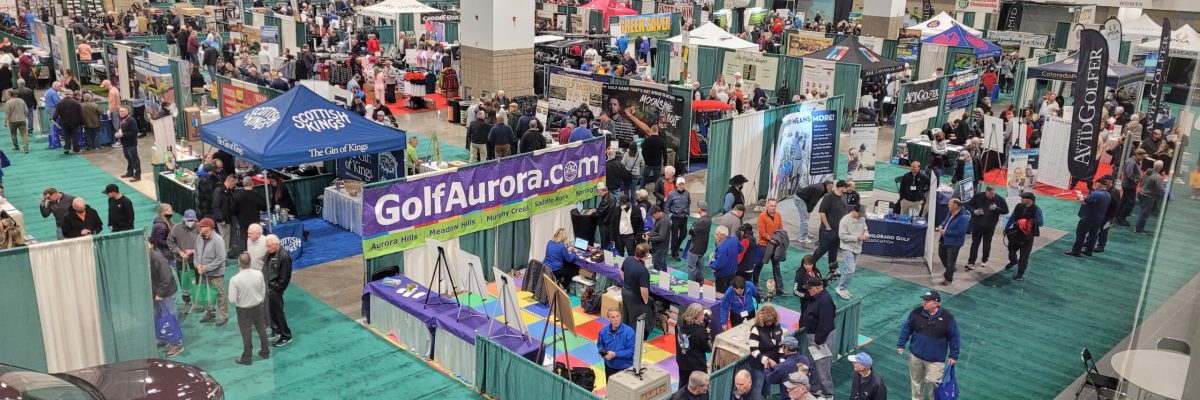
A History of the Colorado Golf Expo (Formerly Denver Golf Expo)
Origins in the Early 1990s: Founding and Early Years
The Colorado Golf Expo, originally named the Denver Golf Expo, was established in the early 1990s by Colorado PGA professionals Stan Fenn and Danny Harvanek. This period marked a surge in golf’s popularity across the United States, driven by the emergence of charismatic figures like Tiger Woods and the expansion of consumer golf culture. In Colorado, a state with a growing population and a robust outdoor recreation economy, the Expo emerged as a response to the demand for a centralized event where enthusiasts could explore new equipment, connect with golf organizations, and engage with the sport’s community.
The Denver Golf Expo was initially hosted at the Denver Mart, a now-defunct trade show venue in northwest Denver that served as a hub for regional commerce in the mid-20th century. Conceived as a trade show for golf industry professionals and enthusiasts, the early Expo was modest in scale, focusing on equipment displays, instructional seminars, and networking opportunities. It aligned with the Colorado Golf Association (CGA) and Colorado PGA’s missions to promote the sport, leveraging Denver’s growing status as a regional economic center. The founding by Fenn and Harvanek, both respected figures in Colorado’s golf community, lent credibility and ensured alignment with the state’s golfing institutions.
The Cramer Era (2000–2022): Transformation into a Consumer Spectacle
In 2000, Mark and Lynn Cramer acquired the Denver Golf Expo, ushering in a transformative period that elevated it from a niche trade show to one of the nation’s premier consumer golf exhibitions. The Cramers, a husband-and-wife team with a passion for golf and event management, brought a professionalized approach, expanding the Expo’s scope and appeal. Under their stewardship, the event became a three-day annual gathering, typically held in mid-February around Presidents’ Day weekend, drawing thousands of attendees to the Denver Mart.
The Cramer era coincided with significant developments in Colorado’s golf landscape. The state’s population grew from 4.3 million in 2000 to over 5.7 million by 2020, fueling demand for recreational activities. Golf courses, both public and private, proliferated, with Colorado boasting over 240 courses by the early 2000s. The Expo capitalized on this growth, offering a platform for vendors to showcase equipment, apparel, and travel packages, while providing free lessons, swing analyses, and seminars on topics like the Rules of Golf. The event also strengthened ties with organizations like the CGA, Colorado PGA, and the Colorado Golf Hall of Fame, which celebrated its 50th anniversary at the 2023 Expo.
Attendance during the Cramer years grew steadily, with figures peaking at 10,131 in 2015 and consistently hovering between 7,000 and 9,000 in other years. The Denver Mart’s accessibility and ample space allowed for a diverse exhibitor base, typically 80–100 vendors, including major brands like Callaway, TaylorMade, and local retailers like Lenny’s Golf Shop. The Cramers introduced consumer-friendly features, such as contests (e.g., long putt challenges) and discounted rounds, making the Expo a one-stop shop for golfers preparing for the season. Their contributions were recognized with the Colorado Golf Hall of Fame’s Lifetime Achievement Award in 2019, cementing their legacy as stewards of Colorado’s golf community.
The Denver Mart’s closure in 2021, a casualty of urban redevelopment and shifting commercial priorities, forced a significant change. The Cramers relocated the 2022 Expo to the Colorado Convention Center in downtown Denver, a modern facility reflective of the city’s 21st-century revitalization. Concurrently, they rebranded the event as the Colorado Golf Expo, signaling its statewide appeal and aligning with Denver’s growing metropolitan identity. The 2022 Expo, held February 11–13, marked their final event as owners, drawing 8,500 attendees despite logistical challenges like higher parking costs and urban navigation.
Transition to Kevin Morton (2022–Present): Continuity and Modernization
In November 2022, Kevin Morton, a Pueblo native and longtime golf enthusiast, purchased the Colorado Golf Expo through his company, Tee Box Events. Morton’s background as a high school golfer, summer counselor at the Billy Casper Golf Camp, and trade show professional in the 1990s and 2000s equipped him to take the helm. The Cramers agreed to consult during the transition, ensuring continuity. Morton closed the deal on November 30, 2022, facing a compressed timeline to prepare for the February 17–19, 2023, Expo at the Colorado Convention Center.
The 2023 Expo: A New Era Begins
Morton’s first Expo as owner maintained the event’s core elements—exhibitors, free lessons, and seminars—while introducing innovations to attract younger audiences. A standout addition was the “Back Nine Mini Golf” course, a nine-hole setup designed to engage families and juniors. Inspired by his own children’s enjoyment of golf, Morton aimed to foster a sense of fun, stating, “I want to foster a sense of enjoyment, not make it a chore.” The 2023 Expo featured nearly 90 exhibitors, including the CGA and Colorado Golf Hall of Fame, and drew an estimated 7,195–9,937 attendees over three days. Seminars covered topics like junior golf programs and equipment fitting, while contests offered prizes like trips to premier courses. The event’s success, despite the short preparation period, demonstrated Morton’s organizational acumen and commitment to the Expo’s legacy.
The 2024 Expo: Building Momentum
Held February 16–18, 2024, the Expo saw a surge in attendance to 9,015, the highest since 2019 and the third time in a decade surpassing 9,000. Morton introduced a “Links & Drinks” area with live music, featuring performers like Kimberley Dahme, a former member of the rock band Boston. This addition reflected broader trends in experiential events, blending sport with entertainment to appeal to a younger demographic. Morton’s focus group research revealed that younger golfers found the sport expensive and time-consuming, prompting initiatives like a donation of 10 sets of golf clubs and a simulator to Rangeview High School in Aurora, in partnership with French, GOLFTEC, and Callaway. This effort aimed to make golf accessible to underprivileged students, aligning with national pushes for inclusivity.
Social media engagement also increased under Morton, with platforms like Instagram and Facebook driving an “exponential” growth in the Expo’s online presence. The 2024 event retained traditional features—free lessons, a junior golf zone, and vendor deals—while optimizing exhibitor layouts for better traffic flow, leveraging Morton’s trade show expertise.
The 2025 Expo: A Shift in Timing
In a significant departure, the 2025 Colorado Golf Expo, held March 7–9, moved from its traditional February slot due to feedback that Presidents’ Day weekend conflicted with skiing plans and limited date availability at the Colorado Convention Center. Morton noted, “This was the earliest in March we could do, and we didn’t do any later than that because people, depending on weather, could be out on the golf course.” Held in Hall D, the Expo sold out with nearly 100 exhibitors and introduced a World Long Drive demonstration featuring champions like Monica Lieving and Andrew Eigner, capitalizing on golf’s growing appeal as a spectacle. The junior golf zone, free 10-minute lessons, and contests like a long putt challenge with a trip to Chambers Bay as a prize continued to engage diverse audiences. Attendance figures for 2025 are not fully documented, but the sellout suggests robust interest.
The Future: Relocation to the National Western Center (2026)
In May 2025, Morton announced that the 2026 Expo, scheduled for March 6–8, would relocate to the National Western Center’s new Livestock Center. This move addresses logistical challenges at the Convention Center, such as high parking costs and long walks, while offering more space for vendors and interactive features. The National Western Center, part of Denver’s ongoing redevelopment, represents a modern venue aligned with the city’s 21st-century identity. Morton emphasized, “This move will allow the Colorado Golf Expo to expand its offerings and enhance the overall experience for attendees and exhibitors alike.” The relocation promises to accommodate growing exhibitor demand and introduce new elements, such as expanded demonstrations and family-oriented activities.
Historical Significance and Broader Context
The Colorado Golf Expo’s history reflects the evolution of golf in Colorado and the United States. In the 1990s, golf surged as a consumer sport, driven by media exposure and economic prosperity. The Expo’s founding by Fenn and Harvanek tapped into this wave, while the Cramers’ 22-year tenure transformed it into a cultural institution, mirroring Colorado’s growth as a recreational hub. Morton’s leadership since 2022 has navigated a post-pandemic landscape, where golf saw renewed interest (e.g., a 2020 National Golf Foundation report noted a 13.9% increase in rounds played nationally). His innovations—mini-golf, live music, and community outreach—respond to demographic shifts, particularly the need to attract younger and more diverse golfers.
The Expo’s venue changes—from the Denver Mart to the Colorado Convention Center to the National Western Center—parallel Denver’s urban transformation. The Denver Mart’s closure in 2021 marked the end of an industrial era, while the Convention Center and National Western Center reflect Denver’s shift toward a modern, tourism-driven economy. The rebranding to the Colorado Golf Expo in 2022 underscores its statewide significance, as Colorado’s golf community spans urban centers like Denver and rural areas like Pueblo.
Economically, the Expo has been a boon for local businesses, with vendors reporting significant sales and networking opportunities. Its role as “The Winter Gathering of the Colorado Golf Industry” (as described by Colorado AvidGolfer) fosters connections among players, professionals, and organizations, reinforcing Colorado’s status as a golf destination with courses like Cherry Hills and TPC Colorado hosting national events.
